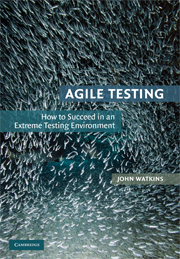Book contents
- Frontmatter
- Contents
- Foreword by Bob Bartlett
- Acknowledgments
- 1 Introduction
- PART 1 REVIEW OF OLD-SCHOOL AND AGILE APPROACHES
- PART 2 EVERYONE IS DIFFERENT: AGILE CASE STUDIES
- 4 From Waterfall to Evolutionary Development and Test
- 5 How to Test a System That Is Never Finished
- 6 Implementing an Agile Testing Approach
- 7 Agile Testing in a Remote or Virtual Desktop Environment
- 8 Testing a Derivatives Trading System in an Uncooperative Environment
- 9 A Mixed Approach to System Development and Testing: Parallel Agile and Waterfall Approach Streams within a Single Project
- 10 Agile Migration and Testing of a Large-Scale Financial System
- 11 Agile Testing with Mock Objects: A CAST-Based Approach
- 12 Agile Testing – Learning from Your Own Mistakes
- 13 Agile: The Emperor's New Test Plan?
- 14 The Power of Continuous Integration Builds and Agile Development
- 15 The Payoffs and Perils of Offshored Agile Projects
- 16 The Basic Rules of Quality and Management Still Apply to Agile
- 17 Test-Infecting a Development Team
- 18 Agile Success Through Test Automation: An eXtreme Approach
- 19 Talking, Saying, and Listening: Communication in Agile Teams
- 20 Very-Small-Scale Agile Development and Testing of a Wiki
- 21 Agile Special Tactics: SOA Projects
- 22 The Agile Test-Driven Methodology Experiment
- 23 When Is a Scrum Not a Scrum?
- PART 3 AGILE MY WAY: A PROPOSAL FOR YOUR OWN AGILE TEST PROCESS
- APPENDIX A The Principles of Rapid Application Development
- APPENDIX B The Rules and Practices of Extreme Programming
- Appendix C The Principles of the Dynamic Systems Development Method
- Appendix D The Practices of Scrum
- APPENDIX E Agile Test Script Template
- Appendix F Agile Test Result Record Form Template
- Appendix G Agile Test Summary Report Template
- Appendix H My Agile Process Checklist
- References
- Index
13 - Agile: The Emperor's New Test Plan?
Published online by Cambridge University Press: 26 October 2009
- Frontmatter
- Contents
- Foreword by Bob Bartlett
- Acknowledgments
- 1 Introduction
- PART 1 REVIEW OF OLD-SCHOOL AND AGILE APPROACHES
- PART 2 EVERYONE IS DIFFERENT: AGILE CASE STUDIES
- 4 From Waterfall to Evolutionary Development and Test
- 5 How to Test a System That Is Never Finished
- 6 Implementing an Agile Testing Approach
- 7 Agile Testing in a Remote or Virtual Desktop Environment
- 8 Testing a Derivatives Trading System in an Uncooperative Environment
- 9 A Mixed Approach to System Development and Testing: Parallel Agile and Waterfall Approach Streams within a Single Project
- 10 Agile Migration and Testing of a Large-Scale Financial System
- 11 Agile Testing with Mock Objects: A CAST-Based Approach
- 12 Agile Testing – Learning from Your Own Mistakes
- 13 Agile: The Emperor's New Test Plan?
- 14 The Power of Continuous Integration Builds and Agile Development
- 15 The Payoffs and Perils of Offshored Agile Projects
- 16 The Basic Rules of Quality and Management Still Apply to Agile
- 17 Test-Infecting a Development Team
- 18 Agile Success Through Test Automation: An eXtreme Approach
- 19 Talking, Saying, and Listening: Communication in Agile Teams
- 20 Very-Small-Scale Agile Development and Testing of a Wiki
- 21 Agile Special Tactics: SOA Projects
- 22 The Agile Test-Driven Methodology Experiment
- 23 When Is a Scrum Not a Scrum?
- PART 3 AGILE MY WAY: A PROPOSAL FOR YOUR OWN AGILE TEST PROCESS
- APPENDIX A The Principles of Rapid Application Development
- APPENDIX B The Rules and Practices of Extreme Programming
- Appendix C The Principles of the Dynamic Systems Development Method
- Appendix D The Practices of Scrum
- APPENDIX E Agile Test Script Template
- Appendix F Agile Test Result Record Form Template
- Appendix G Agile Test Summary Report Template
- Appendix H My Agile Process Checklist
- References
- Index
Summary
SYNOPSIS
“Steve, about every five years,” Ross Collard once told me, “you'll hear about the NGT in software testing.” “The NGT?” I questioned. “Yes, NGT – the next great thing.” Ross was one of my first ever teachers of software testing and in those early days in 1995 I learned a remarkable amount from him about how to test and what it means to deliver quality software.
Toward the end of the 1990s the NGT was RAD (Rapid Application Development) and five years later, in 2005, the NGT for me was agile testing. This was to be the savior of testing projects throughout the Western world. Nothing could stop it or stand in its path. Nonbelievers were cast aside as the NGT drove a coach and horses (or tried to) through the established numbers and acronyms of my beloved software testing world (IEEE 829, DDP, ISO 9126, TickIT, ISO 9000, RBT, Test Strategy, MTP, IEEE 1012, IEEE 1044, Test Cases).
Books and papers were written, seminars delivered, and agile manifestos created for all to worship and wonder at. It was time to cast aside the restrictive clothing of software test documentation and formal methods and enjoy the freedom of exploratory testing in a context-driven world. The Emperor's new test plan was born!
Introduction
My name is Steve K. Allott and I am a chartered information technology professional (CITP), who has worked in the IT industry for over twenty-five years, after graduating with a computer science degree.
- Type
- Chapter
- Information
- Agile TestingHow to Succeed in an Extreme Testing Environment, pp. 86 - 92Publisher: Cambridge University PressPrint publication year: 2009



